There was good news for Twickenham Chess Club in January 1889. A victory against Acton gave them an impressive 100% record for the season.
We note a new name among the winners: as well as a Bull (here and here) we now have a Fox to add to the menagerie.

Eighteen months later, and Mr A M Fox was by now winning every game in the handicap tournament off scratch. Twickenham was one of the strongest suburban chess clubs, and Mr Fox was perhaps their strongest player, which suggests that he was pretty useful.

His full name was Arthur Makinson Fox, born in Dorchester, Dorset in 1863, the son and grandson of Congregational Ministers, although his father, Joseph Makinson Fox, converted to the Church of England in 1886. An uncle, Daniel Makinson Fox, was a railway engineer who led the construction of the São Paulo railway, and one of Arthur’s brothers, John Ernest Ravenscroft Fox, was a landscape artist.
Arthur shared an occupation with Robert Davy Ganthony: the 1881 census found him in Dudley, Worcestershire, articled to a dentist. It appears that, in those days, training to be a dentist required an apprenticeship rather than a university education.
By 1882 he found himself in Teddington, perhaps still training to be a dentist, but also the organist at Christ Church, Teddington, in whose church hall Richmond & Twickenham Chess Club met until a few years ago.
In 1887 he married Helen Maud McComas, the daughter of an Irish merchant living in Hampton Road, Teddington, not too far from the Roebuck. They settled in the same road, but closer to the town centre: a house named Brendon, 32 Hampton Road, on the corner of Coleshill Avenue (perhaps this house), just round the corner from the Cowards. Three daughters, Dorothy, Helen and Violet, soon arrived to complete the family, and they would remain there for the rest of their lives. None of their daughters married: they weren’t the only spinster sisters in Teddington.
In 1889 he wasn’t new to chess. Since at least the beginning of 1888 he’d been solving problems in the Morning Post, and occasionally tried his hand at composing as well.
This example seems to me to be pretty crude and forgettable: he doesn’t seem to have shared Cecil Alfred Lucas Bull’s talent for composition. Have a go at solving it yourself and see what you think. The solution is at the end of the article.
#3 Arthur Makinson Fox Morning Post 3 December 1888
In 1893 Joseph Henry Blackburne returned to Twickenham for another simul. Arthur Fox was the only player to win his game.
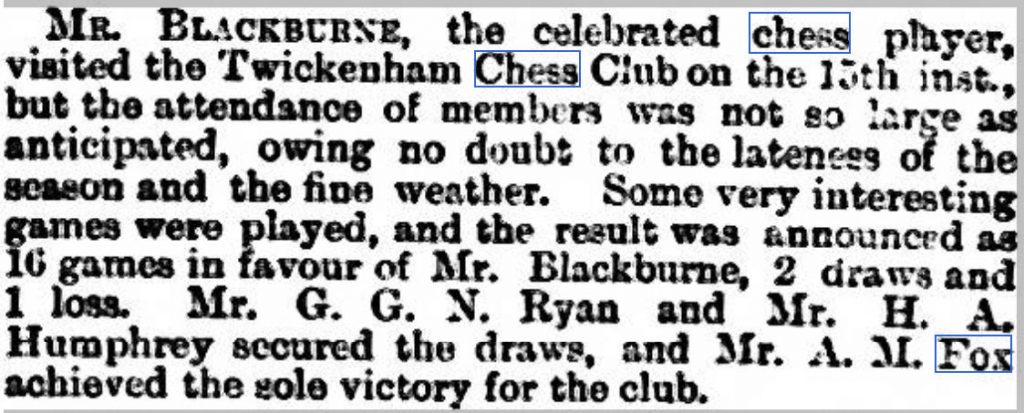
In between dentistry and chess he also found time to study music at London University, being awarded a Bachelor’s degree in 1893.
Arthur seems to have been a real chess addict. He wasn’t just a member of Twickenham Chess Club, but also a number of clubs in central London. I presume he took the train up from nearby Teddington Station.
Here he is, for example, in 1901, playing for the British Chess Club against a combined team from Oxford and Cambridge Universities, and drawing his game against South African law student Frederick Kimberley Loewenthal, named, like Sydney Meymott, after his place of birth. (Kimberley, not Frederick just in case you were wondering, and apparently not related to Johan Jacob.) There are several interesting names in both teams, some of whom you might meet in future Minor Pieces, but if he’d been one board lower, he’d have met Harold Francis Davidson, a theology student at Exeter College, Oxford.
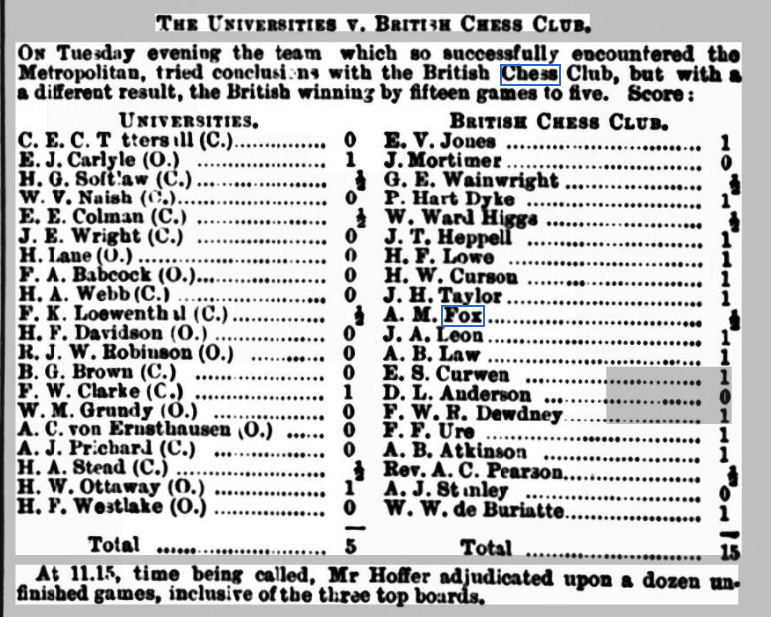
Wikipedia:
At Oxford, Davidson’s behaviour was notably eccentric; he displayed considerable energy but disregarded rules, was persistently unpunctual and regularly failed his examinations. … By 1901 his academic inadequacies were such that he was required to leave Exeter College, although he was allowed to continue studying for his degree at Grindle’s Hall, a cramming establishment. He finally passed his examinations in 1903, at the age of 28, and that year was ordained by the Bishop of Oxford—after some reluctance on the part of the bishop to accept so unpromising a candidate.
Yes, this was the future Rector of Stiffkey, the Rector Who Was Eaten (or, more accurately, mauled) By A Lion, and one of the stars of The (Even More) Complete Chess Addict, co-written by an unrelated Teddington chess player named Fox.
On April Fools Day 1901 the census enumerator called. As you’d expect, Arthur and Helen were at home along with their three young daughters, Helen’s relation Herbert McComas, a Cambridge University student born in Dublin, and three servants, all in their mid 20s: Grace Gisbourne was a cook, Helena Larkham a housemaid and Ellen Gowing a nurse. It must have been rather confusing with two Helens, Helena and Ellen in the household.
Moving forward another decade, not much had changed. Their middle daughter, Helen, had left home to work as a teacher, but Dorothy and Violet were still there, along with the same three servants as ten years earlier.
But there was another resident as well, Douglas Gerard Arthur Fox, the son of Arthur’s brother Gerard, a 17 year old music student.
Douglas was a promising organist and pianist: he was educated at Clifton College, a school with a strong music tradition, and was now studying under Sir Charles Villiers Stanford at the Royal College of Music. The following year he would be appointed Organ Scholar at Keble College, Oxford.
When war broke out he enlisted in the army, and, in 1917, suffered a serious injury requiring the amputation of his right arm. In 1918 he was appointed musical director at Bradfield College, and in 1931 returned to Clifton College, where he was Head of Music until his retirement in 1957. Among his pupils was the great and wonderful David Valentine Willcocks, one of whose brothers, Theophilus Harding Willcocks, was a mathematician and chess problemist.
For further information about Douglas Fox see here, pp 11-14. You might even want to buy a book here.
At some point, perhaps round about his 50th birthday, Arthur Makinson Fox decided to retire from his work as a dentist, giving himself more time to spend on music.
In 1912 Arthur and his wife contributed two guineas to a fund to rebuild the organ at St James’s Church, Hampton Hill. They lived in the parish of St Peter & St Paul, Teddington, but it’s possible they preferred to worship at St James’s. just a mile down the road. (Walk along Hampton Road past the Roebuck and keep going.) It’s also quite possible that Arthur was the organist there. (A more recent organist at St James’s, Mark Blackwell (2015-2018) is the brother of one of my first private pupils, Richard, who played for Cambridge in the 1986 Varsity Match.)
In 1914 St James’s appointed a new vicar, the Rev Richard Coad-Prior, who had a lot in common with Arthur Makinson Fox, sharing his passion for both music and chess. In February that year, he played for London University in a match against Cambridge. There, sitting almost opposite him, was Richard’s only son Eric, who would himself have a long career as a strong club and county player.
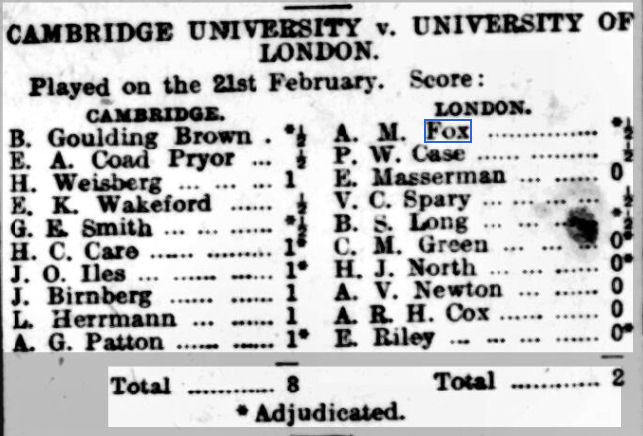
Arthur’s opponent in this match, Bertram Goulding Brown, was well known as, amongst other things, a chess historian. He had played in Varsity Matches a decade or so earlier, and was now, I think, a lecturer in history. This may have been a ‘past and present’ match, or perhaps Arthur was now associated with London University again in some way.
This is the last match result I’ve been able to find for Arthur Makinson Fox. Not a lot of competitive chess took place during the war, and perhaps, now in his fifties, he decided to hang up his pawns, at least as far as competitive chess was concerned.
The 1921 census has recently become available online, and we still find him in the same place, along with Helen, Dorothy and Violet, who is now working just a couple of minutes walk away at the National Physical Laboratory. Their servants Grace and Ellen are both still there after more than 20 years.
During this period of his life he continued his interest in music. The two fields which particularly interested him were organ music (he seems to have composed some works for his instrument) and madrigals. He wrote articles for various music magazines and was the President and Librarian of the Madrigal Society. In 1914 he had subscribed to a collection of madrigals composed by Orlando Gibbons. (Beware, though: some online sources attribute two cantatas published in the mid 1870s to Arthur Makinson Fox: they must have been written by another Arthur Fox.)
We can now move forward another 18 years to 1939. Helen Maud Fox died that year, but, apart from his sad loss, there’s no change in the household circumstances from 1921. Arthur, Dorothy and Violet are still there, with Dorothy still carrying out household duties and Violet still at the NPL. And, yes, Grace and Ellen are still there as well, having worked for the family for about 40 years. Quite some loyalty, and I guess Arthur must have been a good employer as well.
Although he may not have played competitively for a quarter of a century, he still kept up his interest in chess. In 1941 he wrote an article for the British Chess Magazine reminiscing about the British Chess Club.
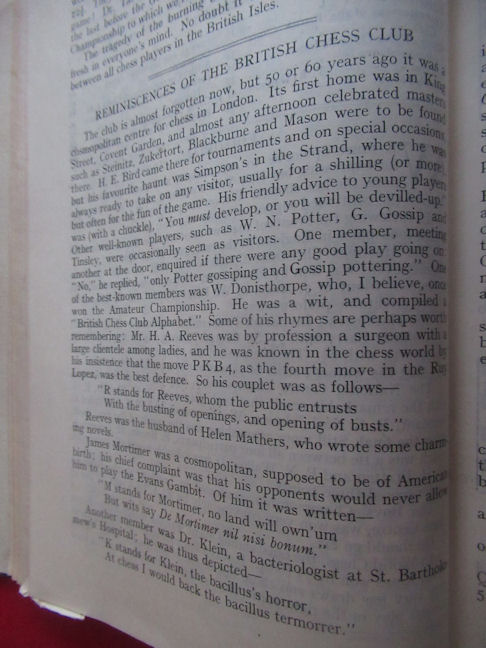
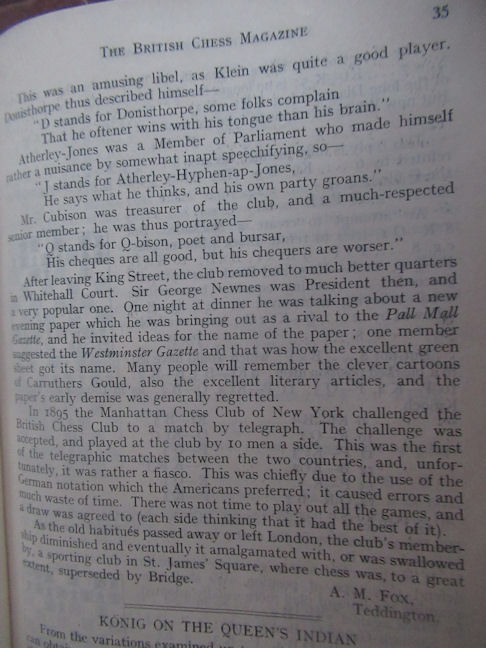
In February 1945 he had a letter published in the BCM joining in a debate about reversing the starting positions of bishops and knights.
He lived a long but relatively uneventful life devoted to his work as a dentist and his twin passions of chess and music. Arthur Makinson Fox’s death at the age of 86 was registered in Middlesex South in the second quarter of 1949.
Acknowledgements and Sources:
ancestry.co.uk
findmypast.co.uk
britbase.org.uk
Wikipedia
Various other online sources
Problem solution:
1. Nd8! followed by 2. Be3 and either 3. Qe6# or 3. Qd4#. The only other variation is 1. Nd8! Kc5 2. Be3+ Kb5 3. Qa4#
